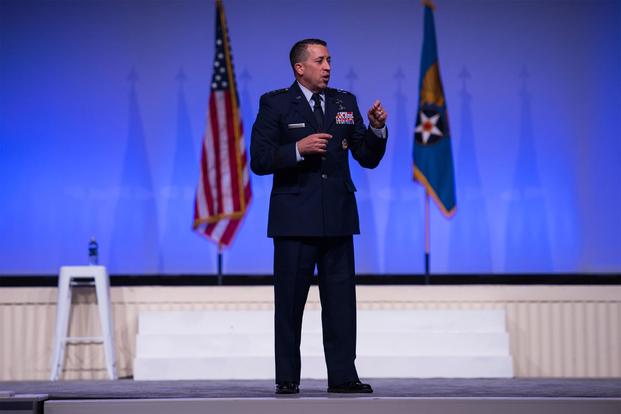NATIONAL HARBOR, Md. -- Warrant officers are not going to become the quick-fix solution to ending the Air Force's pilot shortage crisis, the head of the service's personnel center said Monday.
Citing a recent Rand Corp. study, Lt. Gen. Brian Kelly, commander of the Air Force Personnel Center at Joint Base San Antonio-Randolph, Texas, told an audience here during the annual Air Force Association Air, Space and Cyber conference that the service is looking to other programs, such as the simulator-heavy Pilot Training Next program, as the best way to train more pilots faster and more efficiently.
"The Air Force went out to the Rand Corporation, and it specifically was in regard to our pilot retention crisis and our pilot shortage," Kelly said during his personnel update speech. "They said, 'Would the advent of warrant officers help the United States Air Force in terms of building and retaining pilots?' And the Rand study came back and said no."
Last year's National Defense Authorization Act tasked Rand, a think tank, to explore the feasibility of bringing back a warrant officer corps as the service faces shortfalls in its pilot billets.
Even as the service finds itself in a bind trying to produce enough pilots to sustain a potential future fight, Air Force Secretary Heather Wilson told Military.com in May that neither enlisted pilots nor a warrant officer corps were on the table for the immediate future.
Related content:
- Despite Shortage, Air Force Likely Won't Boost Enlisted Pilot Ranks
- Air Force Wants to Surge Growth by More Than 70 New Squadrons
- F-15X and GenZ: Former Air Combat Command Chief on the Future Air Force
"We have no intention to expand enlisted pilot positions beyond the Global Hawk" community, she said May 4, preceding the Rand study's debut.
"A [warrant officer] component would incur lower personnel costs than the [commissioned officer] workforce it displaced, but the lower compensation levels responsible for the lower personnel costs would also produce lower retention rates. With lower retention, training costs would go up," Rand reported last month.
Kelly said the Air Force has enough volunteers entering the service for pilot training, but struggles to produce enough pilots from that pool to meet requirements.
"Our teammates in [Air Education and Training Command] are ramping that up," he said. "[Air Force Secretary Heather Wilson] talk[ed] about Pilot Training Next and new ways to go faster on that. That's one aspect of system."
Kelly explained that the salary gap is substantial between the commissioned force and warrant officer force, a fact that could prove a deterrent to retention and push more enlisted pilots to leave the service and pursue civilian airline jobs.
"For our officers, the draw between airline salaries and military salaries is a pretty wide gap," he said. "It is an even wider gap between a warrant officer salary and an airline salary, which means that the retention problem just gets exacerbated. So … do warrant officers make sense to come in and help the Air Force with their pilot retention problem, [the] pilot production problem? We're going to go back and say, 'No, they do not.' "
That doesn't mean the Air Force might not build a warrant officer corps for other fields.
Earlier this year, Chief Master Sgt. Kaleth O. Wright, chief master sergeant of the Air Force, said warrant officers could boost growing fields, such as space and cyber.
"I think it would help shortages in career fields. I think it would help with retention. I think it would help with career development," Wright told Military.com in March.
Kelly said such a move could be considered someday, especially if the Air Force finds itself in another tough budget climate.
"That doesn't mean that long term, when we start thinking about people doing technical things, that there isn't a model that potentially looks at warrant officers as a cheaper way for us to look at the overall inventory, try to afford a force as budgets get tight. That might be something in the future," he said. "But right now, we believe we have excellent, excellent technical capability in our enlisted force and we have opportunities to do technical things in our officer force, and we don't think we need warrant officers."
-- Oriana Pawlyk can be reached at oriana.pawlyk@military.com. Follow her on Twitter at @Oriana0214.













